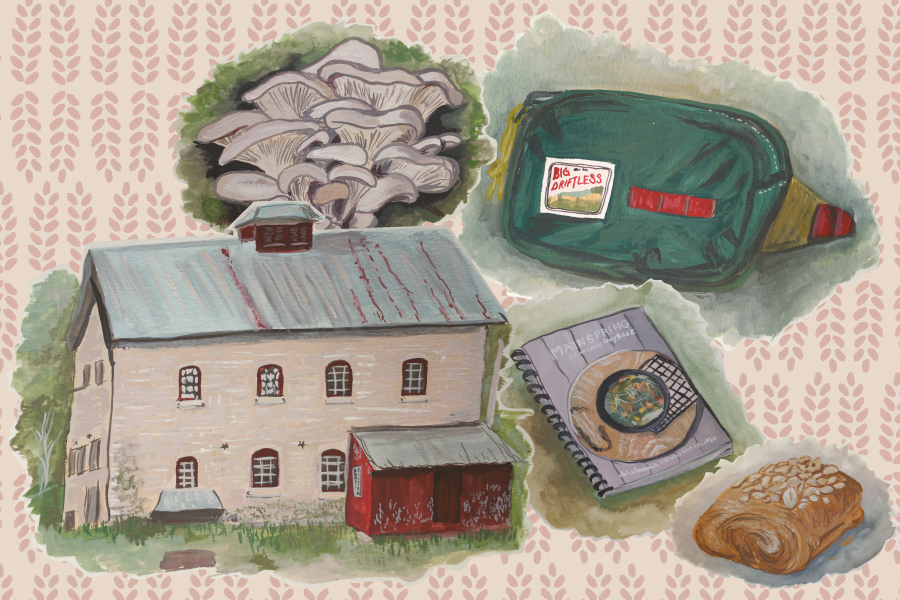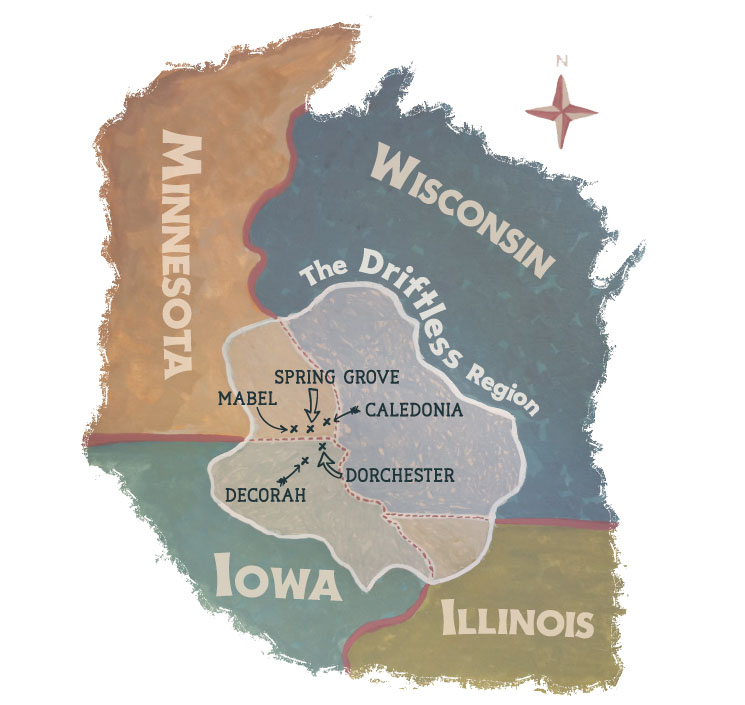
I live just over the Minnesota border in Decorah, IA, in the heart of the Driftless region—a section of the Midwest not affected by glacial drift covering parts of Minnesota, Iowa, Wisconsin, and Illinois. Rivers provide ample opportunities for fly fishing, and foragers find bountiful foodstuffs on the rolling hills.
My corner of the Driftless is brimming with creativity. As the Crystal Creek Citizen-Artist in Residence, I spent 2020 documenting stories of culinary resilience in southeastern Minnesota’s Houston County. I witnessed our food systems firsthand and shared these stories on my website.
Read on to learn about a few creators of delicious and distinctive experiences in this often-overlooked region of the Midwest.
1) Visit Newburg Vintage Home & Garden and Small-Batch Bakery
Imagine the bakery of your dreams with flaky croissants, eclairs, and more. Did you picture a metropolitan city? New York or Paris? How about southeastern Minnesota?
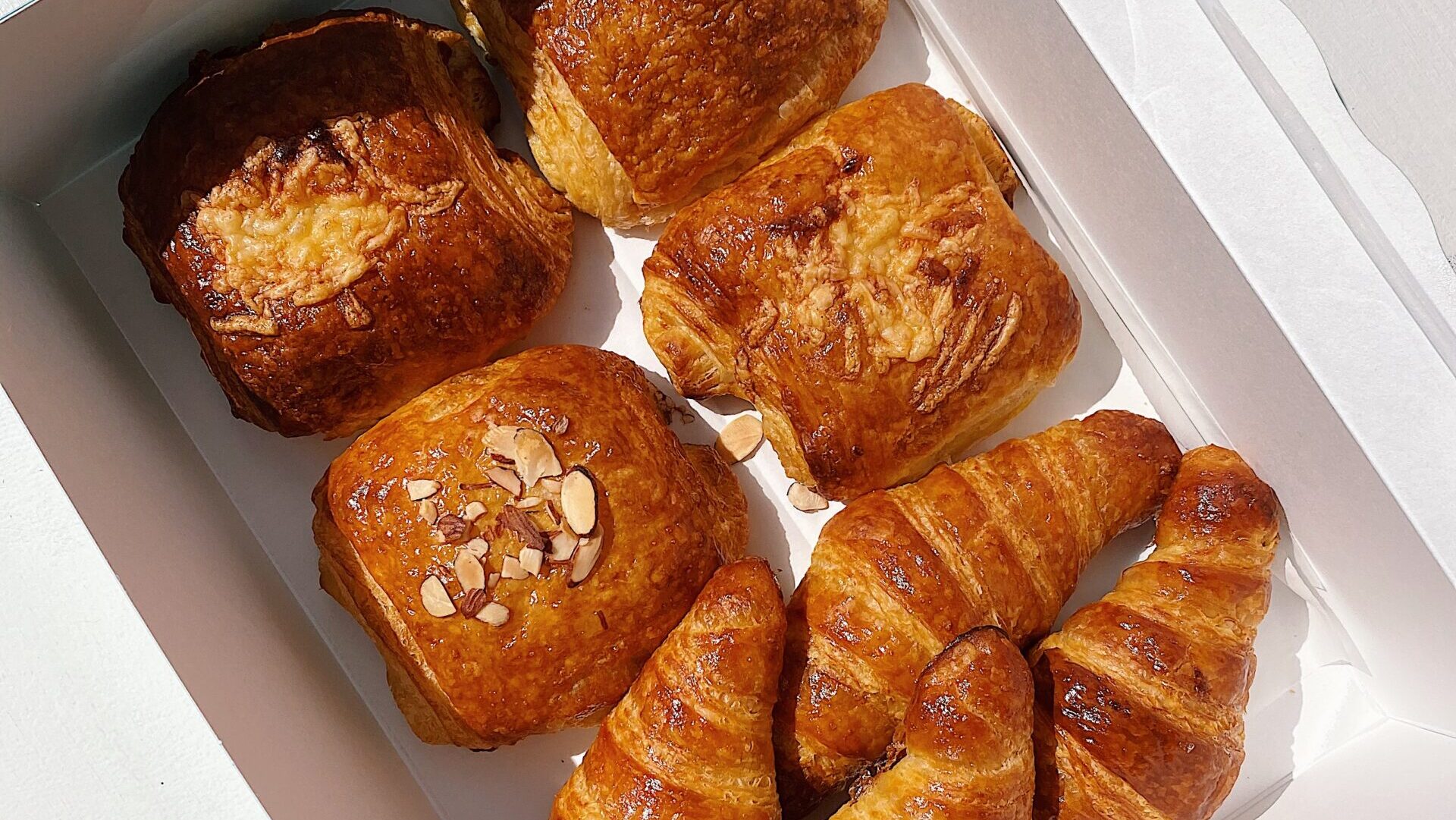
Newburg Vintage Home & Garden and Small Batch Bakery sits at the intersection of a highway and a cornfield, one of a handful of buildings in the unincorporated community of Newburg, MN.
Irene Fishburn starts prepping each Wednesday for Saturday’s three-hour sales window when customers form long lines to enter this delightful shop. Regulars know to order ahead and don’t risk favorite pastries selling out.
When I visited on a warm day in September just minutes after opening, a 20-person line waited patiently in the hot sun. When my croissants emerged in a teal box, I gasped at their beauty.
I haven’t tried the eclairs or brioche or other delicacies. Still, after sampling four varieties of croissants—plain, Dubliner cheese, almond, pain au chocolat—at $3.50 each, I can say the flaky and buttery croissant experience is a must. The Dubliner cheese is my favorite, but just barely.
This gourmet bakery is a reminder to all of us—anything is possible.
2) Check out the Mainspring Community Cookbook
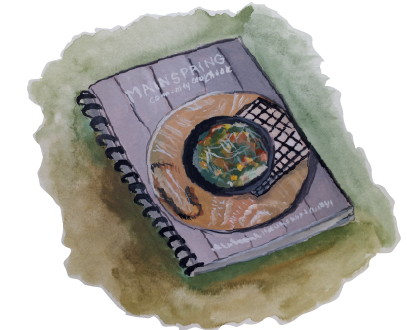
When Melissa Wray returned to her hometown of Caledonia, MN after 13 years in the Twin Cities, she wanted to create a community space that fostered creativity and cultural exchange, much like what she experienced in Minneapolis. She asked herself, Why not be a part of growing those spaces in this rural place that I love so much?
Melissa bought a vacant church building, found passionate board members, and established Mainspring, a non-profit arts and culture organization. After the organization launched in June of 2019 and captivated the community with creative activities for all ages, the pandemic upended its planned programming and forced the board to brainstorm alternatives.
One new programming idea centered on food. Mainspring solicited recipe submissions for a cookbook, and residents and friends shared treasured family favorites and vegetable-forward dishes. Not just your average community cookbook, this one has full-page color photography, an ingredient-based index, and a section highlighting Indigenous chef Elena Terry.
Check out the Mainspring Community Cookbook and watch for socially-distanced outdoor events this summer!
3) Fat Pat’s BBQ & the brilliance of multi-use spaces at Red’s IGA
Patrick Longmire, Jr. of Fat Pat’s BBQ is a self-taught Texas-style BBQ genius. What began as a father and son duo serving BBQ out of a food truck is now a pop-up restaurant at Red’s IGA offering a full menu to patrons in Spring Grove, MN.
Texas-style barbeque out of a grocery store in rural Minnesota?
That’s right. First of all, Fat Pat’s BBQ is legit. At Fat Pat’s, the word BBQ most definitely does not mean a sloppy joe. With a full weekend menu offering barbeque by the pound, sandwiches, brisket-topped burgers, and classic sides, you will not leave hungry.
Secondly, Red’s IGA is an exemplar of rural innovation. They added Jo’s Coffee House in 2019, complete with a drive-up window and a stage for live music. They opened a pet boutique. And unlike many small-town grocers, they stock local foods like mushrooms, goat cheese, and vegetables.
Patrick soaks french fries in vinegar for tangy deliciousness, and his slaw is light and crisp. The melt-in-your-mouth beef brisket is so good I have yet to branch out to other crowd favorites: burnt ends, baby back ribs, and pulled pork. My classic order is a side of hand-cut fries and a brisket sandwich topped with slaw. Visit and sample for yourself—you’ll soon have your own favorite!
For more about Fat Pat’s BBQ, read this interview with Patrick Longmire, Jr.
4) Visit ArtHaus for unique classes & a photo by the mural
At ArtHaus in Decorah, you’ll find classes in all the mediums you might expect…and some you might not, such as snow sculptures or “Mythical Creatures and More.” A natural dye garden is opening this summer for classes and community fabric-dyeing projects.
ArtHaus is a cornerstone with classes in visual, literary, and performing arts for youth and adults. ArtHaus hosts artist shows, poetry slams, and storytelling workshops. The Open Studio and Ceramic Cafe create opportunities for expression. Area artists sell handmade work in the Makers Market, and there’s a kiosk from Cardboard Robot, Decorah’s art and maker shop.
Check out the stunning mural at ArtHaus created by local artist Mathew Havran as part of a project promoting diversity in public art. The project also taught mural painting techniques to area artists. Look for more murals brightening Decorah buildings in the future, and for now, stop by ArtHaus and snap a photo with the mural.
5) Shop Reconnected Farms & buy local mushrooms
Many Driftless residents spent 2020 discovering new outdoor activities like mushroom foraging. Tanner Sanness of Reconnected Farms took the idea one step further.
Tanner never expected to become a producer of gourmet mushrooms, he just wanted to make his own lion’s mane mushroom health supplements. But when the pandemic upended his job, he bought a grow kit and started researching. In March of 2020, Tanner and his father built their first moisture-controlled grow room.
One year later, Reconnected Farms produces almost 200 pounds of mushrooms per week out of a shipping container on their farm in Dorchester, Iowa. They grow oyster and lion’s mane mushrooms and are expanding to add king trumpet, shiitake, and reishi mushrooms later this year.
Their mushrooms are available across the region in grocery stores and food co-ops. Restaurant sales are starting to increase. Rubaiyat in Decorah offers a Grilled Bison Strip Steak with Reconnected Farms oyster mushrooms.
Tanner is hopeful about the future now that mushroom production is becoming more popular in the U.S. and the health benefits are more widely known. Next time you’re shopping for mushrooms, buy the local ones. According to Tanner, they’re likely more nutritious.
Look for Reconnected Farms mushrooms at these shops and share in the healthy deliciousness of the fungi world.
6) Big Driftless is outfitting adventurers across the Driftless
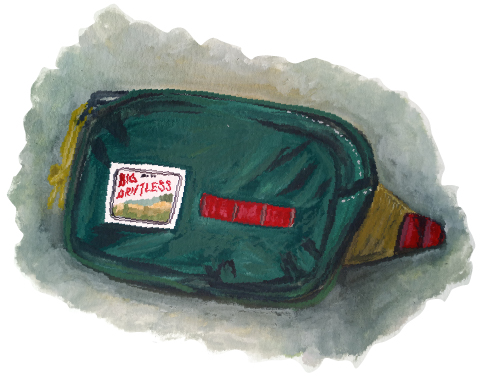
After graduating with a design degree from UC Davis, Cody Whittle hoped to start a brand on the West Coast or work at an outdoor company like Patagonia.
He grew up 40 miles from Decorah, but never fully appreciated the area. During his ten years on the West Coast, he started noticing a shift each time he visited home. More people were using the term Driftless. But he still imagined his life in California or nearby. So when he moved home temporarily, he didn’t expect to stay and fall in love with the area.
Cody quickly recognized the potential for an adventure brand and through help from the Decorah community, launched Big Driftless in 2018. His first product was The Aldo backpack. Now there are six handmade products plus shirts and hats. As an avid biker, he’s stoked about his newest product, a bike bag. More than anything, Cody wants to cultivate regional pride through Big Driftless. He thinks the area is underrated. As he says, Not only is it a cool backpack, it’s a cool backpack that’s from here.
Cody hopes to reopen the Big Driftless loft space above Impact Coffee in early April. Long term, he wants to be a hub for hatching plans of adventure and creativity. He envisions a speaker series, concerts, documentaries—a place to get excited about the Driftless and draw attention to the grandeur of the region.
7) Dine at Luna Valley Pizza Farm and discover tranquility
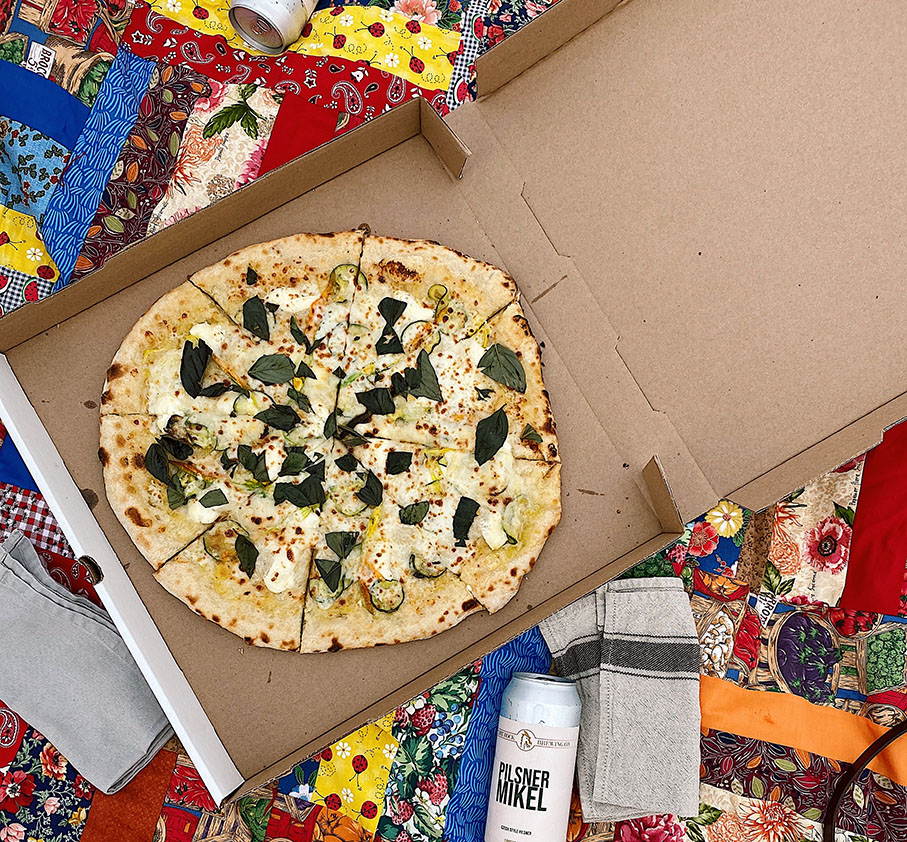
Whenever anyone says “Pizza Farm,” someone inevitably follows up with what, do they grow pizza there?
But others respond with reminiscences of epicurean bliss. For me it’s Luna Valley Pizza Farm outside Decorah where the pizza is divine. I’m not ahead of the game here, even the New York Times understands Luna Valley’s appeal.
Maren & Tom Beard are brilliant hosts, welcoming friends and strangers to their farm for unbelievably good pizza. They don’t know me, but they greet me as if they do. Many of the pizza toppings come from their farm, like squash blossoms, shallots, and Italian sausage, and the rest are sourced locally.
In addition to pizza, Luna Valley offers glamping, rustic yet glamorous camping in a fancy tent with high-quality linens. It’s a perfect launchpoint to explore the Driftless.
A few years ago, Dead Horses played a concert at Luna Valley. With a box of wood-fired pizza on my lap, folk music cutting through the thick humidity, and a sky studded with fireflies, “Pizza Farm” began to mean something magical. And after your first visit to Luna Valley, you’ll feel the same.
8) Check out Caledonia’s revitalized main street
Caledonia, MN is known for hot-air balloons, wild turkeys, barn quilts, and recently, as a place of historic revitalization.
Business owners in Caledonia want to keep their main street alive. To recover from commerce migrating to the outskirts of town leaving downtown buildings neglected, Caledonia business owners partnered with the city to revitalize main street.
A $824,000 Small Cities Development Program Grant provided funds for residential, commercial, and rental property renovations. The Caledonia Downtown Redevelopment Program formed to distribute forgivable loans to encourage building restorations. At least fifteen downtown businesses have undergone significant historical renovations, many with funds from city assistance programs.
Business owner Amanda Wray Ninneman of the Wired Rooster is committed to Caledonia’s downtown. By living above the shop with her family, she’s taking ownership in main street. The Wired Rooster’s beautifully-restored interior and renovated facade shows original, century-old elements, encouraging neighboring businesses to do the same.
For more, read about the Women Revitalizing Caledonia’s Main Street.
9) Tour Schech’s Mill to see history in action
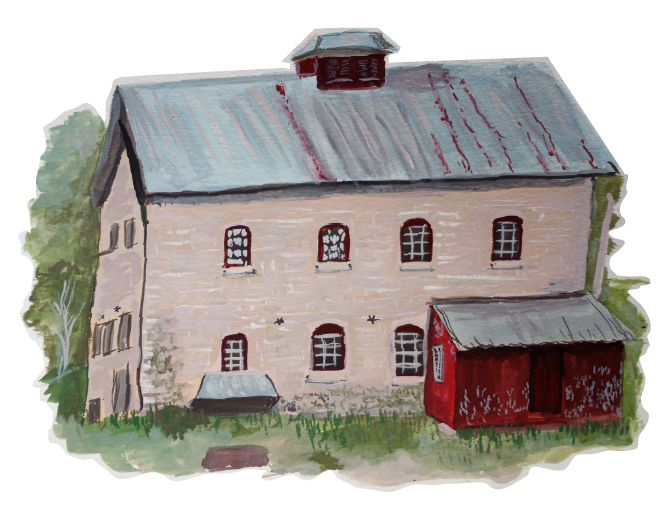
Caledonia is home to Minnesota’s only operational, water-powered mill still using original millstones. Dating back to 1876, Schech’s Mill is perfect for history lovers and anyone interested in unusual food experiences.
Mill tours are $5 and cover an hour-long history lesson by owner Edward Krugmire and a full-scale demonstration of wheat berries being ground into flour. All tours include freshly-milled bags of flour and cornmeal plus a cornbread recipe.
Schech’s Mill may be on the National Register of Historic Places, but it’s not just a historical reenactment—Krugmire mills grain for area residents and businesses including the nearby RockFilter Distillery.
The mill is located near Beaver Creek Valley State Park. Make an outing of it: hike the park, spend a night camping, and visit Schech’s Mill for a blast from the past.
10) Try some of these place-based Driftless foods
This pocket of the Driftless region along the Iowa and Minnesota border overflows with place-forward cuisine. There’s not space for an exhaustive list, so here are a few superstars.
For the best bread you’ve ever had, visit 301 Eatery in Decorah. Open Tuesday-Saturday from 10-2, it’s worth planning your day around. Try the Fried Egg Sandwich, a steal at $5. Taste the rustic sourdough and if you’re lucky, sourdough everything bagels. Darryl also makes rugbrød, a Danish rye that’s the perfect vehicle for open-faced sandwiches.
Within a short driving distance, find superb providers of all things brew: Impact Coffee in Decorah, Carlson Roasting in Houston, and Heart Rock Coffee in Spring Grove for locally-roasted coffee beans or Toppling Goliath and Pulpit Rock in Decorah for exquisite craft beer.
There’s a group of sustainability-minded small farmers doing cool things. Humble Hands Harvest, a worker-owned co-operative farm outside Decorah, is offering add-ons to their weekly CSA boxes to cross-promote other local goods like flowers, duck, and herb-infused honey.
Nettle Valley Farm in Spring Grove produces scrumptious pastured pork. In 2019, they launched an Incubator Farm Program—a way to help beginning farmers gain access to land, equipment, microfinancing, and networking. They’re seeking new participants for 2022.
Fruit Acres, an organic orchard near La Crescent, MN, offers apple picking at their ridge-top property overlooking the bluffs. The apples are delicious, and the new owners want to share this stunning place with visitors.
The Iowa Food Hub is rerouting the connection between local producers and consumers. Originally linking farmers to restaurants and schools, IFH responded to the pandemic by creating an online platform for individuals to order meat, dairy, vegetables, and other comestibles directly from producers. With weekly pickup or home delivery, IFH revolutionized the accessibility of hyperlocal foods.
Free Range Exchange in Hokah, MN is a farmers market-café mashup offering exquisite muffins and scones, bagel sandwiches, and a range of local provisions for purchase. Buy a locally-roasted cup of coffee and get your eggs for the week all in one stop.
Whether you’re looking for coffee, apples, lovingly-raised meat, or the best bread you’ve ever had, you’ll find it here in the Driftless.
